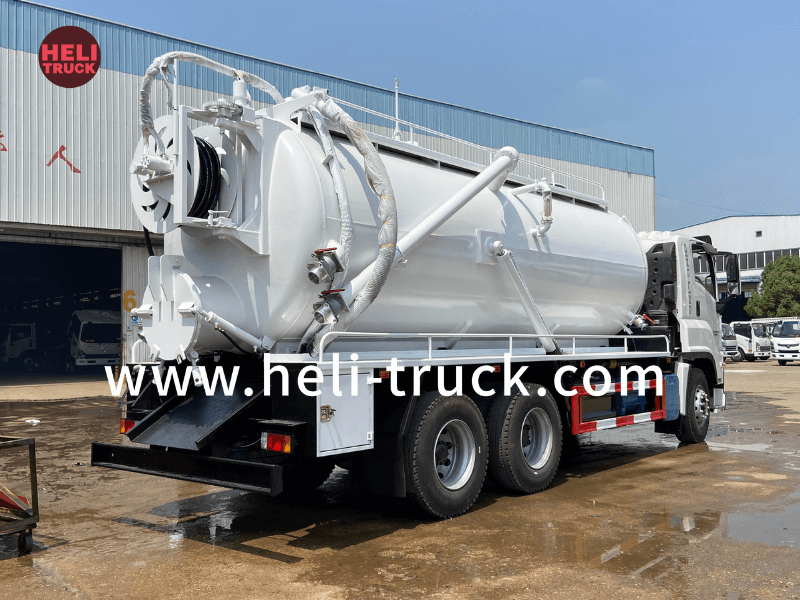Revolutionizing Waste Management in Rural Areas The Role of Garbage Compactor Trucks

Introduction
Waste management is a critical issue that affects communities around the world, including rural areas. Proper waste disposal is essential for maintaining a clean and healthy environment, preventing pollution, and reducing the spread of diseases. In rural areas, where waste collection and disposal systems may be limited, the use of garbage compactor trucks can play a significant role in improving waste management practices. This article explores the benefits of garbage compactor trucks in rural areas and how they can revolutionize waste management practices.
Understanding Garbage Compactor Trucks
Garbage compactor trucks, also known as refuse compactors or trash compactors, are specialized vehicles designed for collecting and compacting solid waste. These vehicles are equipped with a hydraulic system that compresses the waste material, reducing its volume and making it easier to transport and dispose of. Garbage compactor trucks come in various sizes and configurations, ranging from small compactors mounted on pickup trucks to large industrial vehicles used for municipal waste collection.
Benefits of Garbage Compactor Trucks in Rural Areas
1. Improved Waste Collection Efficiency: Garbage compactor trucks can significantly improve the efficiency of waste collection in rural areas. These vehicles have a larger capacity than traditional waste collection vehicles, allowing them to collect more waste in fewer trips. This helps reduce the time and resources required for waste collection, making the process more cost-effective and sustainable.
2. Reduced Environmental Impact: Proper waste disposal is crucial for protecting the environment and preventing pollution. Garbage compactor trucks help reduce the environmental impact of waste disposal by compacting the waste material, which reduces the volume of waste that needs to be transported and disposed of. This can help minimize the amount of landfill space needed and decrease the emission of greenhouse gases associated with waste decomposition.
3. Improved Hygiene and Sanitation: In rural areas, the lack of proper waste management systems can lead to unsanitary conditions and the spread of diseases. Garbage compactor trucks help improve hygiene and sanitation by providing a more efficient and reliable way to collect and dispose of waste. By compacting Water tank truck technology , these vehicles can also help reduce odors and the attraction of pests, further improving the overall cleanliness of the area.
4. Cost-Effectiveness: While the initial investment in garbage compactor trucks may be higher than traditional waste collection vehicles, the long-term cost savings can be substantial. By increasing the efficiency of waste collection and disposal, garbage compactor trucks can help reduce operating costs and improve the overall sustainability of waste management practices in rural areas.

5. Versatility and Adaptability: Garbage compactor trucks are versatile vehicles that can be adapted to suit the specific needs of rural communities. These vehicles can be equipped with different types of compactors, loading mechanisms, and storage compartments to accommodate various types of waste materials. This flexibility allows garbage compactor trucks to handle a wide range of waste collection tasks, from household garbage to construction debris.
Case Studies and Success Stories
To illustrate the impact of garbage compactor trucks in rural areas, it is useful to examine some case studies and success stories from around the world. In India, for example, the government has implemented a program to provide garbage compactor trucks to rural communities to improve waste management practices. By introducing these vehicles, the government has been able to increase the efficiency of waste collection and disposal, leading to cleaner and healthier rural areas.
Similarly, in Africa, several countries have invested in garbage compactor trucks to address the challenges of waste management in rural areas. By introducing these vehicles, these countries have been able to reduce the environmental impact of waste disposal, improve public health, and create new opportunities for recycling and waste recovery.
Best Practices and Recommendations
When implementing garbage compactor trucks in rural areas, it is essential to follow best practices and recommendations to ensure their effective use. Some key recommendations include:
1. Conducting a thorough assessment of waste management needs and infrastructure in rural communities before introducing garbage compactor trucks.
2. Providing training and capacity-building programs for local operators and maintenance staff to ensure the proper operation and maintenance of the vehicles.
3. Establishing clear guidelines and protocols for waste collection, segregation, and disposal to maximize the efficiency and sustainability of waste management practices.
4. Engaging local communities and stakeholders in the planning and implementation of waste management initiatives to ensure their ownership and long-term success.
Conclusion
Garbage compactor trucks have the potential to revolutionize waste management practices in rural areas by improving efficiency, reducing environmental impact, and enhancing hygiene and sanitation. By investing in these vehicles and implementing best practices, rural communities can achieve cleaner and healthier environments, while also creating new opportunities for sustainable waste management practices. As the global population continues to grow, the need for effective waste management solutions in rural areas will only increase, making garbage compactor trucks an essential tool for building a cleaner and more sustainable future.
